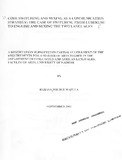| dc.contributor.author | Wafula, Barasa W | |
| dc.date.accessioned | 2013-05-03T06:26:01Z | |
| dc.date.available | 2013-05-03T06:26:01Z | |
| dc.date.issued | 2005 | |
| dc.identifier.citation | A dissertation submitted in partial fulfillment of the requirements for a master of arts degree in the department of linguistics African languages, faculty of arts, University of Nairobi | en |
| dc.identifier.uri | http://erepository.uonbi.ac.ke:8080/xmlui/handle/123456789/18505 | |
| dc.description.abstract | A notable aspect of the speech behaviour of bilingual or multilingual people is that in informal situations they mix the languages they know when communicating
with one another (a phenomenon referred to as Code Switching and Mixing, in the sociolinguistic literature). Taking this aspect of speech behaviour as a strategy of communication, this paper considers some of the sociopsycholinguistic factors that motivate it. This is done within the confines of psycholinguistic theory.
Some of the factors considered include economy of expression, conveyance of particular meanings and desire to talk about many things and experiences, attitudinal issues such as discomfort and impatience with one of the languages at play, and personality issues like confusion, embarrassment and nervousness
The main objective of this paper is to unravel some of the sociopsycholinguistic motivations for Code Switching and Mixing.
The data used are derived from questionnaires (Appendix A), field notes taken by participant observation, and discourse chunks and pieces extracted from natural ethnographic conversations engaged in by/with the respondents. | en |
| dc.language.iso | en | en |
| dc.title | Code switching and mixing as a communication strategy: the case of sw1tching from Lubukusu to english and mixing the two languages | en |
| dc.type | Thesis | en |
| local.publisher | Department of Arts-Linguistics | en |

